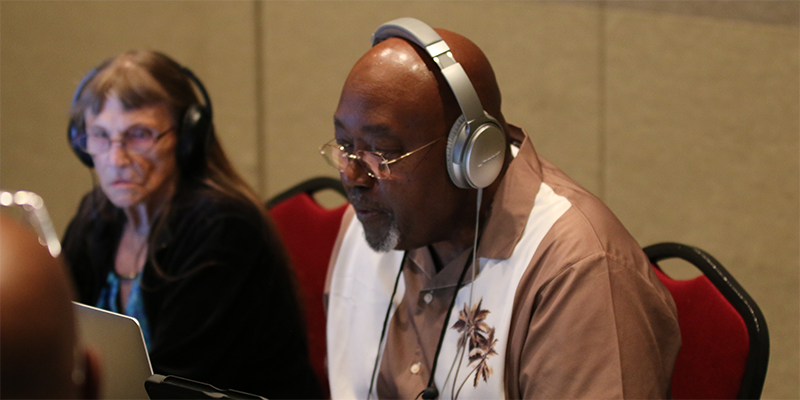
Environmental and Climate Justice committee vice-moderator Judy Aguayo (left) and moderator Samuel Roberts (right), lead the first day of committee meetings on June 25, 2024. Photo by Randy Hobson

Environmental and Climate Justice committee vice-moderator Judy Aguayo (left) and moderator Samuel Roberts (right), lead the first day of committee meetings on June 25, 2024. Photo by Randy Hobson.
On its first day of considering General Assembly business, the Environmental and Climate Justice Committee zipped through half of its agenda for the week, approving a peace pledge, a recommendation to reduce plastic pollution and a paper on the pitfalls of lithium mining.
ENV-01 was originally known as the “Adoption of the Sustainable Peace Pledge,” but the committee passed an amended version, using the term “One Billion for Peace Pledge,” to be in step with an existing global peace initiative associated with BioEarth, a nonprofit organization that is assembling an interfaith coalition.
The overture, sponsored by Charleston Atlantic Presbytery, calls for Presbyterian Church (U.S.A.) agencies and related organizations to come together to develop a “comprehensive, coordinated, global and long-term strategy” to help mitigate climate change.
Overture Advocate Jim Miller gave a brief presentation on the need for the pledge before it was approved by a vote of 32–12.
“The warming of the Earth is bringing about climate change at an exceptional rate due to human activity, and if not mitigated, will have disastrous consequences for life on Earth, particularly human life, and for generations to come,” said Miller, a retired teaching elder. The One Billion for Peace Pledge “is a commitment to action that can mitigate those consequences. It is a pledge to join with others across the globe together and each in their own way to reduce the sources of and … mitigate consequences of climate change.”
The committee also passed ENV-03, an overture from the Presbytery of Susquehanna Valley titled “On Becoming Free from Plastic Pollution.” Approved by a vote of 39–5, the overture is designed to move the church from a “disposable culture to a reusable, sustainable one” by reducing the use of single-use plastics and packaging.
It encourages education within congregations and communities to advocate for alternatives to single-use plastics, whether through mitigation efforts and campaigns or by supporting local and state bans on single-use plastics.
June Eakin, a ruling elder from Warner Memorial Presbyterian Church in Kensington, Maryland, spoke in support of the overture during a public hearing that preceded the committee vote. She described how plastics are interwoven with the fossil fuel industry and highlighted the plight of marginalized communities.
“Plastic production in the U.S.A. has increased greatly as it shifted from oil to methane,” she said. “Unfortunately, these polluting facilities are being located near populations of low-income and people of color. The fossil fuel industry views plastic production as Plan B to continue increases in oil and gas extraction.”
Eakin went on to say, “To stop plastic pollution, we must reduce plastic production. One first step is to stop using single-use plastic and reduce plastic use where we can. Let us be united with our brothers and sisters in the United Church of Christ, who passed their resolution of witness to be free from plastic pollution last year.”
The Rev. Bruce Gillette, a New York pastor and member of the Presbytery of Susquehanna Valley, also spoke in favor of the plastic reduction proposal.
Although plastic has vital uses, including in the making of medical equipment that helped to save his life after he was diagnosed with acute leukemia, churches must be educated to avoid plastic pollution whenever possible for the sake of God’s Creation, he said.
“Plastics are now one of the greatest environmental disasters on our planet, polluting the Earth that we are passing on to our children and subsequent generations,” said Gillette, volunteer moderator for Presbyterians for Earth Care. “God placed Adam in the garden to serve it and to preserve it. It is time for the Presbyterian Church to preserve Creation by becoming free from plastic pollution.”
The final item of Tuesday business was ENV-04, a lithium mining paper from the Advisory Committee on Social Witness Policy (ACSWP) that seeks, among other things, to protect Indigenous and vulnerable communities as society moves toward a greener economy.
Jed Koball, a mission co-worker in Peru, and Sue Smith, co-chair of ACSWP, both highlighted the need to be in solidarity with Indigenous people and to ensure that they can withhold or withdraw consent for projects that might impact their territories since lithium mining can have negative consequences.
“It’ll mean a lot to the communities that we serve if we say, ‘Hey, we stand with you on this, ensuring that this right is fully supported and enacted,’ and we can use this policy as well in advocacy spaces,” said Koball, the Joining Hands catalyst for extractive industries, the environment and human rights. When the U.S. is engaged in negotiations, “we can then weigh in” and advocate for free, prior and informed consent.
The Environmental and Climate Justice Committee will meet again on Wednesday to consider further business. The schedule includes opening hearings on ENV-02, “On Removal of Investments In and Subsidies For Fossil Fuels,” and ENV-06, “Response to the 225th General Assembly Directive on Applying Environmental Policy and Continuing Corporate Engagement.”
